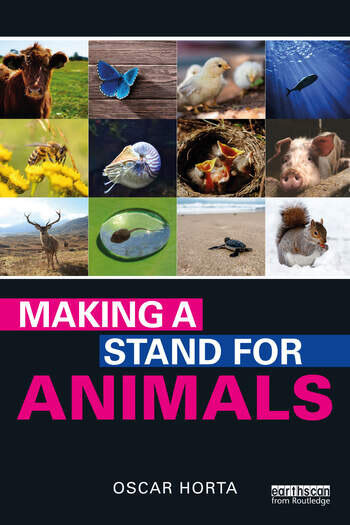Making a Stand for Animals
In his didactic book, Making a Stand for Animals, Oscar Horta, an animal activist and a co-founder of the Oakland, California-based nonprofit Animal Ethics, demands that we examine our attitudes toward non-human animals and to become aware of the urgent need to advocate for the legal protection of all sentient beings, human and non-human. Horta does so by compelling the reader to confront speciesism, which he defines as “the discrimination of those who don’t belong to a certain species.” Speciesism is manifested in the belief that human beings are superior to non-human animals. It also is the reason why certain species, such as dogs and cats, tend to receive better treatment than other vertebrates such as mice and fish.
A moral philosopher at the University of Santiago de Compostela in Spain, Horta forcefully drives home the point that speciesism is a form of discrimination and that discrimination, whatever form it takes, is always evil and ugly. He devotes the entire third chapter, “Harming Animals,” to discussing the suffering caused by hunting, fishing, and factory farming. And in one section he describes in gruesome detail the terrible anguish animals endure in slaughterhouses, not only on the killing floor itself but also in the holding area. This segment includes interviews with slaughterhouse workers who recount in horrifyingly vivid detail the way they had entertained themselves by sadistically torturing animals. The brutality, in and of itself, is shocking. But so, too, is the fact that legally, there is little or nothing that can done to punish the people who commit such heinous acts. This chapter is not for the faint of heart, but it serves as a powerful impetus for animal rights advocacy.
In Making a Stand for Animals, Horta goes a step further than many other animal rights advocates, because he implores his readers to understand that it behooves us human beings to consider the importance of advocating for the rights of wild animals. Horta argues: “If all sentient beings deserve respect, then this applies to wild animals as much to those that humans exploit.” For example, if orders are given to evacuate a certain area due to a natural disaster, this evacuation order should also extend to the wild animals who are in harm’s way. He also presents the argument that culling certain species of wild animals—such as wild horses—in the name of environmentalism should be prohibited. “If we respect animals as sentient individuals, we will reject such interventions as harmful for them,” he asserts.
Throughout the book, Horta provides his readers with tangible advice about how we can begin to make a difference for animals. A strong advocate for veganism, he provides a guideline for gradually adopting a vegan lifestyle: trying a vegan diet for a while, following a vegan diet at home or when one is cooking, having one vegan day a week, then increasing it to two, then three, etc. He also urges readers to engage in outreach work to educate as many people as possible about the harmful effects of speciesism, for example, by aligning themselves with like-minded organizations and work on campaigns that reach the general public or target people in specific, influential fields, such as academia, law, politics, and education.
Horta also implores us to go beyond ourselves and advocate for legislation that will protect the rights of all sentient beings. This would include appointing public officers to protect animals, making it compulsory to include wild animals in rescue protocols, constructing wild animal hospitals, and including education about social concern for non-human animals in elementary and secondary school curricula. He emphasizes this point with the subtitle of the book’s conclusion: “Making a stand for a better world.”
“Thus, we find that whether we maintain a more hopeful attitude or a more cautious one, we reach a similar conclusion,” he writes, “we need to promote respect for all sentient beings right away.”
Regina Faighes is a data analyst at Candid.









